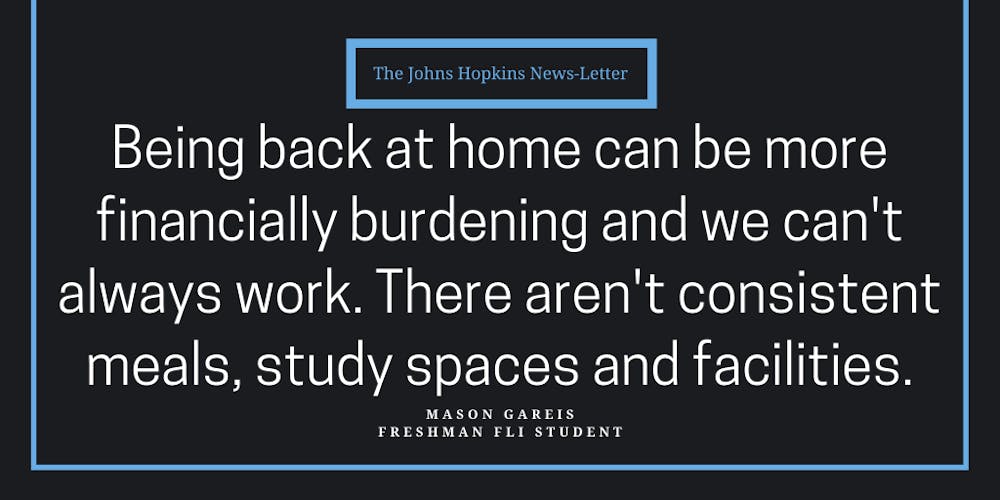“I started thinking about the jobs I had on campus and how I was going to support myself in terms of rent. How would I pay? Do I go home?”
That is how senior Sean Stielow, a First-Generation Limited-Income (FLI) student, recalled his reaction to the announcement on March 10 that in-person classes would be canceled through at least April 12. Eight days later, online classes were extended through the end of the semester.
The ongoing coronavirus (COVID-19) outbreak and its effects are exposing and deepening inequality across the country. The University has extended over $5 million to students and their families in the form of emergency grants; however, the pandemic and transition to remote learning still pose unique challenges for students from low-income families and students who are the first in their family to attend college.
In November 2018, class of 1964 alum and former New York City Mayor Michael Bloomberg donated $1.8 billion to Hopkins, allowing the University to permanently conduct need-blind admissions for American students. In light of the historic donation, University President Ronald J. Daniels shared his goal for 20 percent of the student body to be eligible for federal Pell Grants, which support students from low-income families, by 2023.
This November, Executive Director for Student Success Kelly Barry told The News-Letter that 21.4 percent of undergraduates are FLI and that 19 percent of freshmen are Pell-eligible. She and Dean of Academic and Student Services Andy Wilson stated that they were taking a more concerted approach to supporting FLI students this fall.
In August, the FLI Network founded the inaugural Pre-Orientation program specifically for FLI students. Launched during the summer of 2018, the Network comprises students, staff and faculty, and its purpose is to promote solidarity, belonging and success among FLI students.
Junior FLI student Maame Oforiwaa Amoah-dankwah highlighted the support the University has offered to FLI students amid the pandemic.
“Hopkins is accommodating. Even if they don't have the right answers, they don’t leave you hanging and they get you connected,” she said. “The FLI community is very integrated, and it’s helpful to know that you are not alone.”
Financial Impact
Mason Gareis, a freshman FLI student majoring in Biomedical Engineering, explained how the transition back home can be a financial burden.
“It’s almost ironic how being at college can be cheaper for FLI students in the long run,” he said. “Being back at home can be more financially burdening and we can't always work. There aren't consistent meals, study spaces and facilities.”
For junior Jalen Jones, losing her job in Scheduling and Event Services at Charles Commons meant financial instability for her household. Jones, who lives in Las Vegas, also noted that her parents are unable to work remotely because they are employed by casinos.
“I was completely panicking because casinos shut down. I was thinking of ways to help my parents but also pay my rent,” she said. “It’s nice that they are paying student employees.”
According to the broadcast sent on April 10, the University will continue to pay student employees, waive requirements for expected contributed earnings from summer jobs of need-based financial aid students and replace the funds with institutional grants.
Furthermore, in an email to The News-Letter, Barry and Director of Student Outreach and Support (SOS) Liz Winberry detailed the University’s course of action to support FLI students.
To address these concerns, Barry and Winberry explained that SOS case managers are working with students one-on-one to holistically assess their current and anticipated needs to effectively identify and remove barriers to success amidst the ongoing COVID-19 pandemic. They noted that Student Disability Services has worked to tailor and transition accommodations to remote learning and continues to navigate more complex student learning situations with faculty.
They added that the University has ensured students have access to online learning resources and were able to return home.
“The university was able to book flights for students who otherwise wouldn’t have been able to get home as the emergency hit — sending students home to 17 states, one U.S. territory and two other countries (Taiwan and Kenya),” they wrote.
By March 13, Vice Provost for Student Affairs Alanna Shanahan emailed all students who live in University housing instructing them to vacate residential buildings by March 15.
“We will be making limited exceptions to required student departures for those who cannot return home due to international travel restrictions, financial hardship, or other extraordinary circumstances,“ Shanahan wrote.
Winberry further specified the assistance that various offices provided residential students at that time.
“During the university move-out a few weeks ago, Student Outreach & Support, along with Financial Aid, and the Office of International Student Services were in Charles Commons to help students who had concerns about the leaving campus due to financial issues, uncomfortable home environments, or a lack of resources to support learning styles and circumstances,” she wrote.
Many students, however, have reported receiving insufficient support from the University with regard to their housing.
Barry and Winberry explained that Dining Services is offering to-go meals for residential students remaining on campus. Campus Safety and Security, maintenance, custodial services and residential mail, they added, are also operating.
Junior Zainab Jimoh discussed how these offices have helped her pay for her rent and approve financial appeals during the pandemic.
“They are my backbone on campus,” she said. “If I didn’t have those offices, I wouldn’t be in the place I am.”
Tuition Reduction
On April 10, the University launched a broadcast addressing tuition reduction, additional policy revisions and extended deadlines for Krieger School of Arts and Sciences (KSAS) and Whiting School of Engineering (WSE) undergraduates.
A letter sent on behalf of the Class of 2020, which was addressed to senior administrators at the University, asked for two main stipulations: permission for students in their last semester to drop non-essential classes and change their status to part-time students; and an extension for tuition refunds. The letter, which was signed by over 50 seniors, elaborated on why they believed their tuition should be refunded.
“This semester has been costly due to extra travel and possible bills associated with additional medical care,” the letter reads. “Please look out for us as we enter the workforce, medical school and graduate school and protect our interests, goals and dreams as best as you can with a partial tuition refund.”
In response, the University extended deadlines for dropping a course, requesting a leave of absence and receiving partial tuition refund for this semester to 4 p.m. on Friday, April 17.
Approved students graduating in May 2020 who need fewer than 12 credits will receive a 40 percent refund of the per-credit tuition rate associated with the number of credits they are dropping below the 12-credit full-time minimum, or $738 per credit hour based upon the per-credit tuition rate of $1,845. Institutional financial aid and scholarships will be adjusted at the same rate.
Similarly, on March 31, the Student Government Association endorsed a letter calling on University President Ronald J. Daniels and Board of Trustees Chair Louis J. Forster to remit 25 percent of students’ spring 2020 tuition.
According to both of these letters, the quality of education from remote online learning does not compare with in-person classes, and thus a portion of tuition should be refunded.
Gareis explained that he is taking two labs this semester and the money going towards lab chemicals, equipment and hands-on lab experience is being substituted for an online video demonstration.
“We pay for quality and that is getting reduced,” he said.
Likewise, Stielow not only expressed concerns with education quality but emphasized that they are not getting the facilities and study amenities that are paid for by tuition. Stielow also signed other petitions for tuition reduction on change.org.
“Am I really getting what I’m paying for, especially as a senior with pass/fail grades?” said Stielow.
In an email to The News-Letter, Assistant Vice President of External Relations Karen Lancaster clarified the University’s plan for tuition reductions.
“We can certainly all agree that this is not the spring semester any of us envisioned,” she wrote. “Yet with current plans in place to complete the academic year and deliver on its mission in service of its students, the University is not currently offering tuition refunds.”
Adjusting to Academics at Home
On March 27, it was announced that KSAS and WSE would adopt a universal satisfactory/unsatisfactory (S/U) grading system this semester.
Amoah-dankwah explained that the universal S/U system has alleviated some of that stress.
“The pass fail allows me to not worry about all the systematic issues at the ground level for all of us,“ she said. “I don’t have to worry about competing with someone way better off than me for a better grade.”
Gareis, explained that, while he was doing well this semester, he understands the need for the policy.
“I'm not upset. I understand what it can be doing for FLI students. You have to think in terms of academic equity by taking the situations of all students into account,” he said.
In an email to the student body, Provost and Senior Vice President for Academic Affairs Sunil Kumar acknowledged that the effects of COVID-19 pose a variety of challenges that not all students would share.
Amoah-dankwah noted her own challenges in balancing academics and providing for her brother, as her mother works overtime.
“I have the responsibility to myself but also with my family. I have a seven-year-old brother that I have to nanny. My mom is a nurse but overworking because of that,” she said. “There's an unstable internet network, and suddenly we have to worry about schoolwork and be considerate of my mom as well.”
Barry underscored the The Center for Student Success’ commitment to FLI students.
“We’re making every effort to make FLI students aware of resources,” she wrote. “We’re committed to knowing our students, their stories, and what they are experiencing now.”





